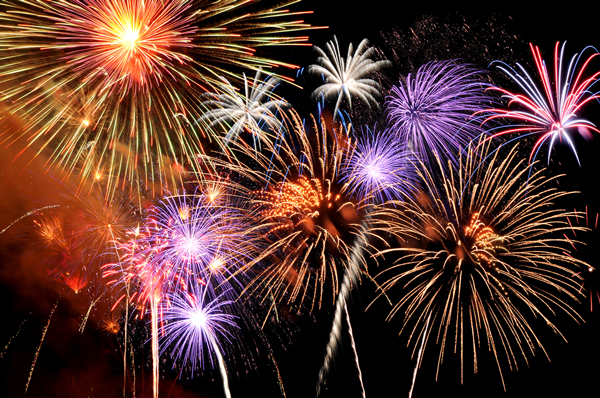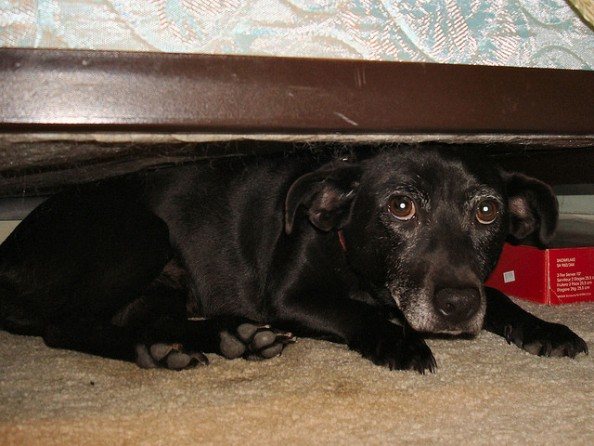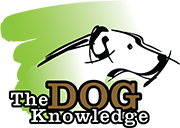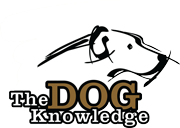As a dog trainer at Charlotte’s premiere dog training facility, The Dog Knowledge, I am shocked by the number of families that bring a dog to the 4th of July fireworks. The poor things try to get away from the loud bangs, but they can’t. Some of them look terrified. As a dog trainer, and a therapy dog and service dog trainer, when I see the panic on a dog’s face, it is really sad. With the 4th of July holiday on Friday, we would like to address what we feel as professional dog trainers might be helpful to dog owners to understand how likely their dog perceives this favorite American holiday.
All of us at The Dog Knowledge have personal dogs. While we have tried to expose our personal dogs to every noise and situation, as dog training professionals we know the signs to look for to determine our personal dog’s stress level. Fireworks, thunderstorms, cars backfiring, even the crash of a dropped pot are torture to some dogs. A dog that is “sound sensitive” reacts in a fearful manner to loud noises. Some sound sensitive dogs try to hide, others want to climb into their owner’s lap, and still others try to flee, to escape. If you have a sound sensitive dog, you know the agony of his fear.

Sound sensitivity is also called being `noise shy’ or `gun shy’. It can be either congenital or environmental. Some noise shy dogs are born that way, while others may undergo a frightening experience connected to a loud noise that thereafter causes them to associate the noise with the fear-producing event. A dog that is less than a year old might be going through their second fear period which happens around 8-10 months of age. While a dog of any age who has never shown signs of being noise sensitive can suddenly develop thunder phobia or fear of loud noises, dogs less than a year old are even more susceptible. As Charlotte’s most knowledgeable dog trainers we agree that the best thing you can do for your dog is to avoid having your dog join in Charlotte’s annual celebration.
Regardless of whether a dog is born with sensitivity to loud noises, or experiences something upsetting that he or she then associates with noise, there are some do’s and don’ts to make your dog more comfortable during a noisy event. Even dogs that don’t react fearfully to loud noises should be protected as much as possible from the potentially painful effects of noise, especially those as predictable as fireworks on July 4th. So take a little advice from the dog trainers at The Dog Knowledge and follow the guidelines we’ve compiled.
- Don’t take your dog to the fireworks. Even if your dog is not noise sensitive beforehand, experiencing the explosive noise of fireworks can make him so. As painful as the loud booms are to you, your dog’s ears are far more sensitive. A dog doesn’t understand either the noise or what it’s for and truly suffers fear and pain in this situation.
- Do plan ahead before the fireworks start so you aren’t rushing around at the first loud sound trying to figure out what to do with the dog. It’s too late at that point, and your frantic behavior will only increase your dog’s anxiety.
- Don’t talk soothingly to your dog, saying things such as “It’s all right. Mama loves you.” Your attempt to calm him or her will serve to reinforce the fear. It is as if you are saying, “It’s all right to tremble and shake. I love when you’re frightened.”
Don’t pet and stroke your dog. Soothing touching also reinforces the fearful behavior. It is the same as saying, “Trembling is good, and I’ll pet you as long as you shake.” - Do try to create a light, happy and fun atmosphere. Try telling jokes and talking lightly. If you’re alone with your dog, try playing a game with him or her, such as fetch. With a dog that is only mildly upset, your light attitude or the relief of playing a game may override the fear. This tactic won’t help dogs that are extremely upset and fearful.
- Don’t get upset about your dog or your dog’s behavior. Your attitude will affect your dog. If you can’t talk lightly, ignore him.
Do play the TV or music to help cover the noise. If the fireworks are a reasonable distance from your home, you might be able to protect your dog by keeping him in a room away from the noise, and covering the noise. Dogs are calmer when they listen to classical or easy listening music than to rock. - Do get your dog used to being in a dog kennel or crate long before the noisy event. (Too late today). The vast majority of dogs who are afraid of noises prefer to be in small places when they are frightened. They will seek out a closet, go under a bed or behind a chair. A dog kennel or crate is a comforting thing to a dog that is used to it. When a dog has his own place, at the first sign of anxiety they can go into their safe kennel, and stay there until the storm has passed.
- Do think about alternatives for places your dog can stay if you live close to fireworks, or in a neighborhood where individuals play with noisemakers such as caps. You might consider boarding your dog for a day or two before the celebration until well after it is over. Inform the boarding kennel operator that your dog is sensitive to noises, and he or she will do their best to protect your dog from noise.
- Don’t give human tranquilizers to a dog. Many people have had success giving their dog six to nine milligrams of Melatonin (a calming hormone that many use as a sleep aid). When in doubt, talk to your veterinarian.
And remember that we have seen hundreds of dogs with dog training issues, fear issues, obedience issues, etc., we understand how traumatic the popping loud noises can be. For this reason, at The Dog Knowledge, we annually have a party time the night of the 4th of July. All the dog trainers are in attendance and we conduct an unexpected play time with all the training dogs that are overnighting with us for the holiday, playing music throughout the building. No training dogs, service dogs or boarding dogs return to their cottage until the dog trainers are certain that the fireworks are over. And just to be safe, we turn up the television in each cottage.

If you have any additional questions about how best to deal with your dog’s fear of loud noises, feel free to stop by The Dog Knowledge located off Wendover Road in Charlotte, NC and any one of the dog trainers and behaviorist on staff will be happy to offer helpful tips. Because we always love to talk “dog.”
Happy Independence Day!

